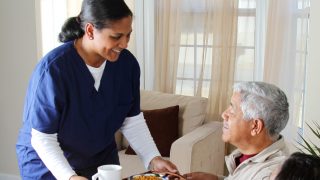A third of care staff are getting less than £100 a week – and some no pay at all – for having to shield or self-isolate during the pandemic, according to a UNISON survey published today (Monday).
The findings – from over 4,000 workers in the UK, including those in care homes and out in the community – also show employees face pressure from bosses to go into work, despite displaying virus symptoms or needing to self-isolate.
Separate evidence seen by UNISON confirms large care companies and many smaller ones across the country are refusing to pay full normal wages for staff affected by Covid – or are telling them to use holiday leave.
Half (51%) of those who completed UNISON’s survey had to self-isolate on occasions in the last 15 months and a similar proportion (49%) did not.
Of those who had to stay at home, only half received full pay. Of the rest, 11% got no pay at all if they had to be off work, a third received statutory sick pay (SSP) of just £96.35 a week, and some (6%) were paid more than SSP but less than full pay.
This is despite government advice to employers to pay all staff in full which was backed by a pledge from health secretary Matt Hancock, says UNISON.
Fear of losing out financially means some staff with suspected Covid continued to care for vulnerable people. Government studies have concluded this has increased the likelihood of Covid-19 outbreaks, says UNISON.
Money worries was the reason given by more than one in ten (13%) care staff for working despite having possible Covid symptoms, and by 8% who continued going in when they should have been off self-isolating.
Pressure from their employer to go to work was an issue for 10% who had possible symptoms and for a similar proportion (7%) of those who should have been self-isolating.
UNISON said the government should guarantee all care sector workers automatic access to full normal wages for periods of self-isolation. Payment should be mandatory and the responsibility of all care employers, the union says.
UNISON general secretary Christina McAnea said: “It’s over a year into the pandemic and staff still face severe financial hardship for self-isolating.
“Care workers who follow official health guidance mustn’t be penalised with huge cuts in wages. Not paying those affected by Covid puts the vulnerable at risk by driving up infections.
“The government should ensure all care employers guarantee staff full income. The care sector also needs to be reformed urgently and that includes decent wages for workers.”
Notes to editors:
– A total of 4,249 social care staff completed the UNISON survey between 3 April and 7 May. This including those working in care homes, providing care to people in their own homes or in supported living, as well as social workers and those providing personal support.
– The Welsh government has ensured staff get full normal pay; and in Scotland, care employees are legally entitled to full sick pay which is the equivalent of full normal pay. The Department of Health in Northern Ireland offered care workers 80% of their pay if shielding or sick due to Covid but this payment has now ended. Care employers in England were meant to use the infection control fund to ensure full pay for staff, but some have refused to do this.
Case studies (all names have been changed):
-Maria supports people with mental health issues. She had to isolate for two weeks in March after a relative tested positive for Covid. However, she was not paid for her time off work because her employer told her to use holiday leave. She says: “I’ve never taken a day off sick in my job. Not because I’ve not been ill, but because I can’t afford to. My colleague had to cover when I was self-isolating and worked 100 hours just in one week.”
-Livia does shifts in a care home for adults with learning disabilities. She had to isolate last April with suspected Covid symptoms. Her employer paid her nothing for the two weeks she spent at home. She says: “I provide financially for my mother and son who live with me. So I can’t afford to self-isolate if I’m not getting paid. It also means I don’t download the test and trace app.”
-Clare, a support worker in a home for adults with mental health issues, was informed by test and trace that she had to isolate last summer. This was after a colleague tested positive for Covid. Again, she was told to use holiday leave or apply for SSP. She says: “You feel undervalued, unappreciated and angry. We’ve worked through the pandemic and kept our residents Covid-free. I’d no problem isolating. The issue was losing out on holiday. Not getting the full amount of time off when you’ve worked so hard made me feel down and depressed.”
– Social care is one of the issues to be debated at UNISON’s annual conference, which takes place virtually this week.
– UNISON is the UK’s largest union including in social care. It has more than 1.3 million members providing public services in education, local government, the NHS, police service and energy. They are employed in the public, voluntary and private sectors.
Media contacts:
Liz Chinchen M: 07778 158175 E: press@unison.co.uk
Anthony Barnes M: 07834 864794 E: a.barnes@unison.co.uk

